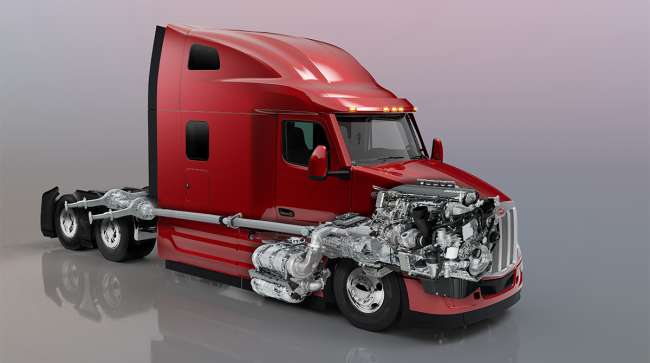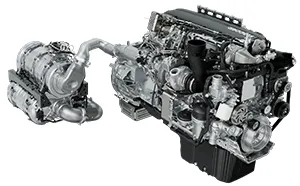Staff Reporter
Peterbilt Introduces CARB-Compliant MX-13 Engine

[Stay on top of transportation news: Get TTNews in your inbox.]
Peterbilt Motors Co. announced that a California-compliant version of the Paccar MX-13 diesel engine is now available in its Model 579, Model 567 and Model 589 trucks.
The engine is compliant with forthcoming California Air Resources Board regulations that aim for a 90% reduction in nitrogen engine emissions compared with current diesel engines. The rule applies to model year 2024 and later medium- and heavy-duty diesel engines.
Denton, Texas-based Peterbilt — a Paccar brand — said orders for trucks with the CARB-compliant engine were now open.
Paccar said changes to the engine to bring it into compliance included redesigns to the pistons, crankshaft and fuel injectors. An all-new exhaust aftertreatment system also was added. This larger-volume aftertreatment system — 70% larger than its predecessor — features a compact twin assembly featuring a 48-volt generator located in the flywheel housing, and an electrical heater located in the inlet to provide lower NOx output. Upgrades to the internal hardware include a larger volume mixer, longer selective catalytic converter and an upgraded NOx sensor design.

Newhouse
Peterbilt said the engines will be built at the Paccar engine plant in Columbus, Miss. Full production is set to begin in the fourth quarter of 2024, and follows several years of field trials, a company representative said.
The CARB-compliant MX-13 engines will be available in two ratings: a 510- horsepower variant with 1,850 pound-feet of torque and a more efficiency-focused version rated at 455-horsepower with 1,650 pound-feet of torque.
“Paccar MX engines were engineered for reliability and fuel economy in a comfortable, quiet and powerful package. The new CARB low NOx Paccar MX-13 engine offers the same great features with a reduced carbon footprint for our customers,” said Peterbilt Chief Engineer Scott Newhouse.
The introduction of the engine follows the July 2023 unveiling of the Clean Truck Partnership, under which CARB and members of the Truck and Engine Manufacturers Association — including Peterbilt parent Paccar — jointly agreed to timelines for introduction of equipment that meets the California rule. The group also includes fellow Class 8 truck manufacturers Daimler Truck North America, Hino, Navistar and Volvo Group North America, parent company of Volvo Trucks North America and Mack Trucks, plus engine supplier Cummins.

The Paccar MX-13 diesel engine is now available in its Model 579, Model 567 and Model 589 trucks. (Peterbilt)
Under the pact, CARB agreed to relax existing state NOx pollution standards to federal levels and in return the truck makers and Cummins promised to meet the state’s zero-emission vehicle and air pollution targets.
While the engine option is primarily intended to meet California rules, other states are also adopting California’s heavy-duty regulations over the next three years. Massachusetts and Oregon, for example, are set to adopt the rules in 2025. New York, Vermont and Washington will follow suit in 2026 and a further four states are set to adopt the regulations in 2027.
Peterbilt said while buyers of the engine are likely to be from these states, it will be available to customers elsewhere in the U.S. and Canada.
In February, Peterbilt sister company Kenworth said it was the first truck manufacturer to offer an engine meeting the California NOx standards, with the introduction of a Cummins X15N option for its T680 sleeper model.
Peterbilt will offer the X15N on its 579, 567 and 520 refuse truck models. The company also expects to start production of the trucks in the third quarter.
Kenworth is expected to make a variant of the CARB-compliant MX-13 diesel engine available to its customers in the fourth quarter.
Want more news? Listen to today's daily briefing below or go here for more info:




